EARLALL webinar on agriculture sector skills and needs
05/02/2024

EARLALL continues its contribution to the European Year of Skills organising a series of webinars focused on exploring the skills needs and challenges in different sectors (agriculture, care, blue economy and textile) across European regions.
On 02 February 2024, EARLALL launched its first online workshop focusing on the skills needs and challenges in the agriculture sector. Participants from regional and local authorities, EU and international institutions, and education and training experts joined the webinar “Understanding agriculture sector skills needs and challenges across European regions” promoted by the EARLALL Working Group on Skills and Labour Market.
From the EU: Structural Challenges and Skills needed in Agriculture
Fabio Cossu, Directorate-General for Agriculture and Rural Development, Unit A1 Policy Perspectives, European Commission, opened the webinar by offering an overview of the European Union’s skills needs and challenges in the agriculture and farming sector. Mr Cossu began by highlighting some of the structural challenges in the agriculture sector. He stated that these challenges encourage us to reconsider not only the kinds of skills needed in the sector, but also the target group of these new skills, and the methods we use to deliver them. Mr Cossu also explained that not only does the twin transition impact agricultural practices, but it also impacts the skills needed in the sector to adapt to these changes. Moreover, reskilling and upskilling of workers needed to accompany agriculture in the green transition must be delivered in a just and fair way.
The agriculture sector’s major challenges are food security (climate change impact), resilience (to be sustainable) and competition (guaranteeing a fair income). On top of that, innovation needs to be at the forefront of the sector. In the area of skills development, Mr Cossu stressed three areas: farm/business development and diversification, Sustainable farming practices and Digital and technological literacy. All three areas relate to transversal skills such as communication learning, and networking, without forgetting the human aspect. Policies need to place people “at first” and think about the attractiveness, inclusiveness, and quality of life in the profession bearing them in mind.
Mr Cossu recognised that there is still more that can be done about skills intelligence (gathering data, such as Cedefop is doing); demand (Attractiveness & quality of learning/training opportunities and skill development) and Prospective (Validation and recognition of qualifications & Lifelong learning pathways). The number of over and underqualified workers in the agriculture sector is one of the highest of all the sectors. If those working in agriculture are not seeking to be reskilled, the offer of training to meet the skills demands of the future will not be provided. He closed his presentation by giving some pointers for local and regional authorities such as the importance of building partnerships between the agri-food industry, agricultural education/training or fostering integrated policy responses to attract talents.
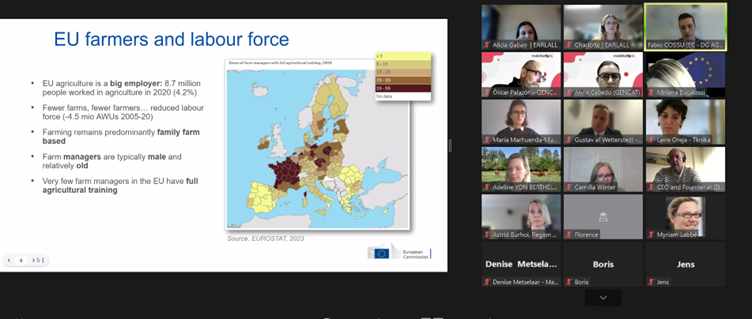
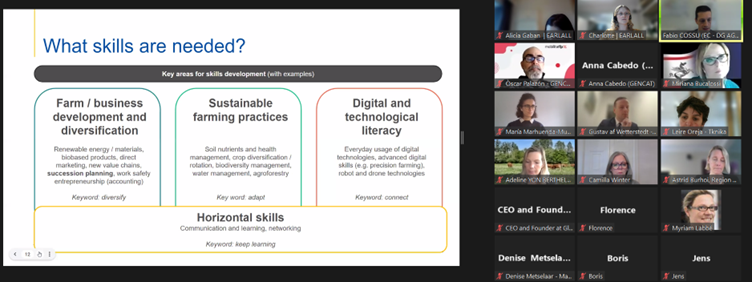
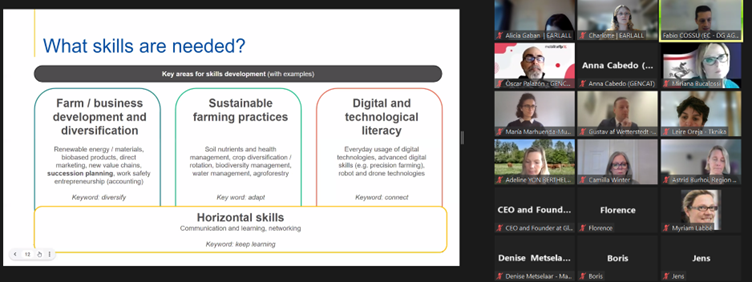
The participants were interested in different subjects such as how to encourage farmers to identify their own skills needs. Cedefop expert shared that the Agency ran a skills foresight on the agri-food sector exploring experts’ views on key jobs and skills for the future sector and the ways that VET can support sectoral workers in this transition, see the publication here.
EARLALL Regions: Challenges and Opportunities for the future of Agriculture
The regional panel included examples from Brittany, Catalonia, Västra Götaland, Tuscany and the Basque Country regions. The speakers identified the main sector skills challenges as follows: the decline in the number of people working in the sector, the generational renewal and the ageing society, sector attractiveness, rural depopulation, the impact of climate change (and droughts), digitalisation, and the skills mismatch.
Brittany
Ms Adeline Yon-Berthelot, a Member of Brittany’s Regional Council, and regional delegate for agricultural training (Brittany Region), explained that they are working to raise awareness about the attractiveness of the sector together with different stakeholders. One example of this is the “Agri challenge” a competition where students are able to present their ideas and are invited to share them in a large expo in Rennes. Ms Yon-Berthelot suggested improving the education system and creating a regional training map.
Catalonia
From Catalonia, Ms María Marhuenda-Muñoz, Internationalisation and Mobility Coordinator at the Agri-food Training Service of Agricultural Schools (Catalonia Region), discussed the importance of digitalization and internationalization in the agri-food sector, highlighting the importance of learning from other countries. She also outlined the Agri-food Training Service’s work in Catalonia, where 50 specialized schools are addressing skills gaps in areas such as forestry, livestock, organic farming, and food production. The service is promoting new technologies through its new technology and horticulture school, offering courses, technical sessions, and validating work experience for farmers.
Västra Götaland
Mr Gustav af Wetterstedt, a regional expert on agriculture policies at Västra Götaland Region (Sweden), talked about the importance of the agriculture sector in the region. Mr af Wetterstedt discussed the shortage of skilled labour in the region and the focus on skills supply in the regional development strategy. He emphasized the role of schools in providing real-life skills education and the relevance of collaboration with higher education institutions. He also mentioned the strategic partnership with the Swedish University of Agricultural Sciences and the importance of creating an attractive job environment to retain skills in the sector.
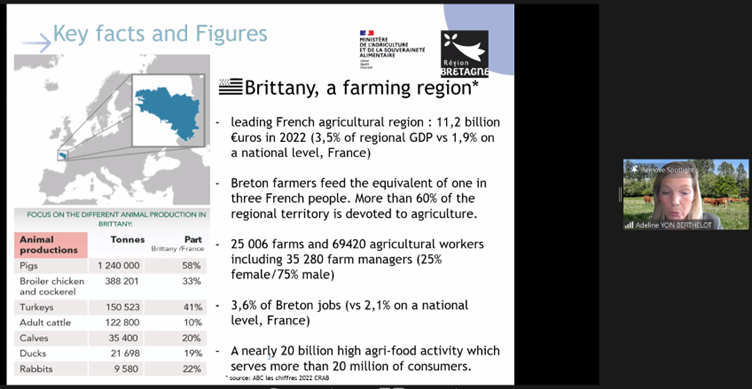
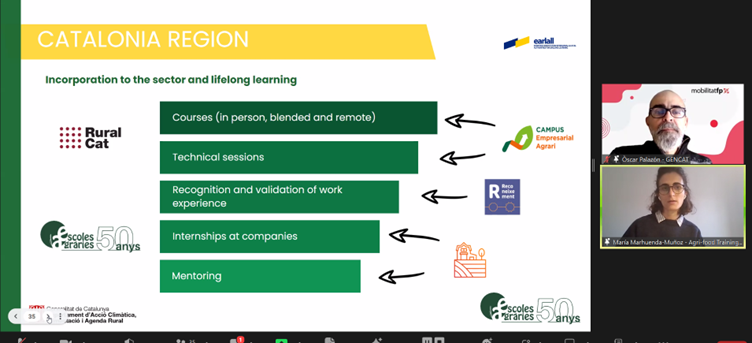
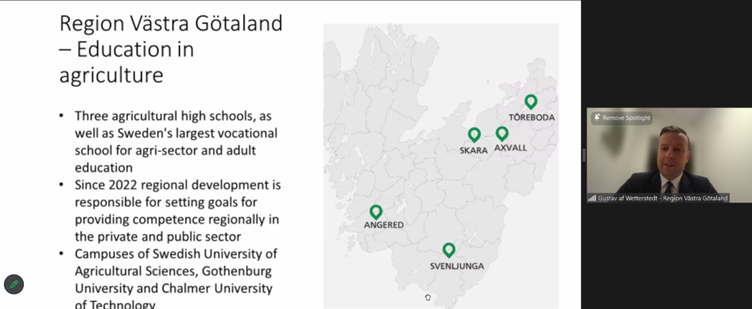
Tuscany
The Tuscany’s Agricultural and Vocational Education Challenges were introduced by Ms Miriana Bucalossi, Head of Apprenticeship, WBL Policies and EU Project Management Unit, (Tuscany Region) and chair of EARLALL Youth Policies Working Group. She highlighted the risks of specializing in high-quality production, such as wine, and the need to support female entrepreneurship in the sector. She also emphasized the challenges posed by climate change, geopolitical uncertainties, and the pandemic, as well as the strengths of the sector, including better education and a higher level of specialized training for young farmers. She also highlighted the importance of flexibility in policy design and the strategic actions taken in Tuscany, including the implementation of dual apprenticeships for wine technicians. Finally, Ms Bucalossi expressed the relevance of company training and the role of sectoral connections with Germany and Italy, which aims to support VET providers, companies, and regions in focusing on green transition and climate change adaptation.
The Basque Country
The webinar ended with a closer look at the innovation in the agriculture sector thanks to the introduction by Ms Leire Oreja, Collaborator in Biosciences and Sustainability area of Tknika, Basque VET Applied Research Centre (Basque Country). She explained the structure of the vocational education system in the country and the importance of developing transversal skills. She then presented a project focused on sustainable food production and digital transformation, which integrates digital solutions to optimize resource usage and promote environmental sustainability.
EARLALL warmly thanked its participants for joining and recognised that there is still work to do, but cooperation and collaboration among local and regional authorities are key to overcoming the challenges. The next sectoral webinar will be focused on the Care Sector across European Regions in April 2024.
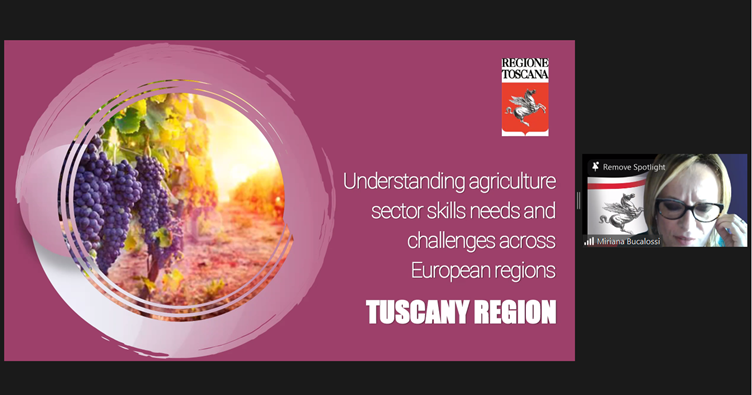
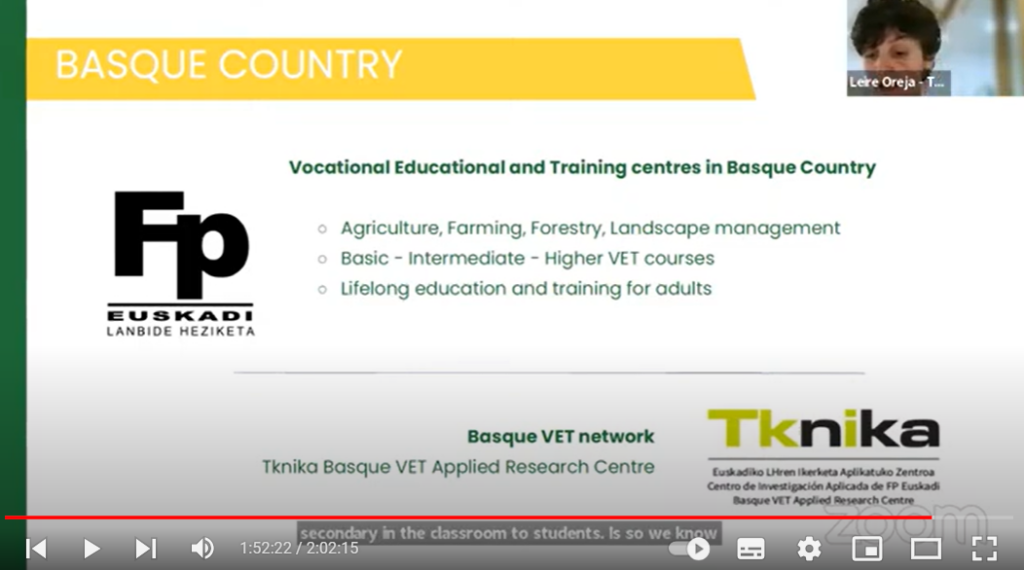
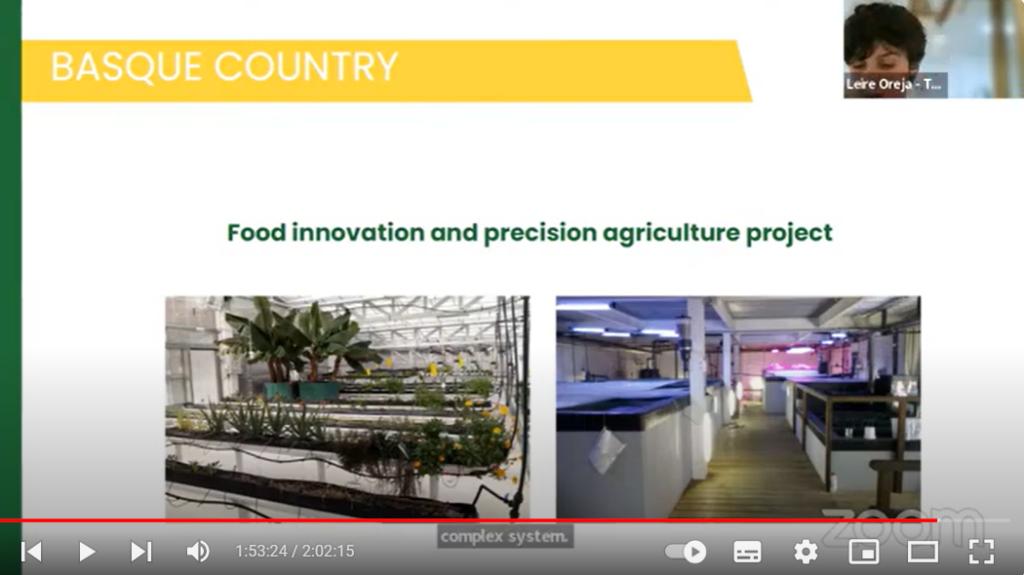
Resources




